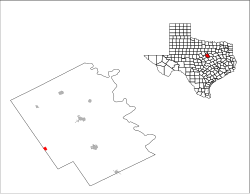Cranfills Gap, Texas
| Cranfills Gap, Texas | |
|---|---|
| City | |

St. Olaf Kirke located just outside Cranfills Gap in the unincorporated rural community known as Norse, Texas
|
|
 Location of Cranfills Gap, Texas |
|
 |
|
| Coordinates: 31°46′25″N 97°49′42″W / 31.77361°N 97.82833°WCoordinates: 31°46′25″N 97°49′42″W / 31.77361°N 97.82833°W | |
| Country | United States |
| State | Texas |
| County | Bosque |
| Area | |
| • Total | 0.7 sq mi (1.9 km2) |
| • Land | 0.7 sq mi (1.9 km2) |
| • Water | 0.0 sq mi (0.0 km2) |
| Elevation | 968 ft (295 m) |
| Population (2010) | |
| • Total | 281 |
| • Density | 400/sq mi (150/km2) |
| Time zone | Central (CST) (UTC-6) |
| • Summer (DST) | CDT (UTC-5) |
| ZIP code | 76637 |
| Area code(s) | 254 |
| FIPS code | 48-17540 |
| GNIS feature ID | 1333628 |
Cranfills Gap is a city located in Bosque and Hamilton counties in Central Texas. The population was 281 at the 2010 census.
Cranfills Gap is located at 31°46′25″N 97°49′42″W / 31.77361°N 97.82833°W (31.773727, -97.828335).
According to the United States Census Bureau, the city has a total area of 0.7 square miles (1.8 km2), all of it land.
The area in which Cranfills Gap is located was originally settled by and named for George Eaton Cranfill in 1851.
Norwegian settlers in and around the community, who were mostly Lutheran, built St. Olaf Kirke (kirke is Norwegian for "church") in a rural area just outside Cranfills Gap. St. Olaf Kirke, commonly referred to as The Rock Church, is a small Lutheran church located in the unincorporated rural community of Norse, Texas. Among the pioneers in Norse was Cleng Peerson. The founder of Norse was Ole Canuteson (Ole Knudsen) from the Stavanger region of Norway. In 1917, as the congregation of that church began to grow, a new church was built for the congregation inside the city.
The city slowly grew to its peak population of 600 in 1940. During World War II, Cranfills Gap was the first city to sell more than its quota of war bonds for the Fourth War Loan Drive. While as many as 25 businesses operated within "the gap", as locals commonly refer to it, the population and the business activity slowly dwindled to roughly nine businesses in 1980 and a population of 269 in 1990.
...
Wikipedia
